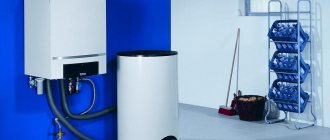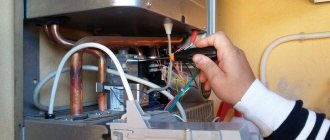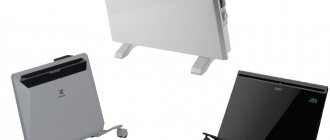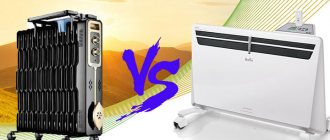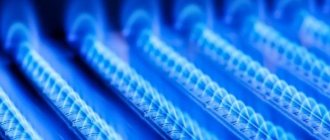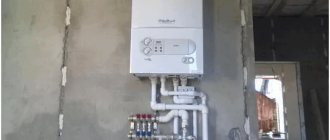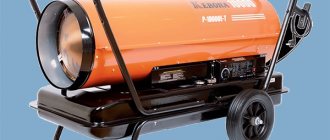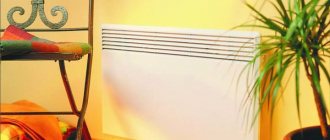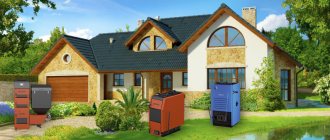Electric convectors that are directly connected to the electrical network via an outlet.
Belarusian-made products - TEPLOPITBEL for heating houses, cottages, apartments, administrative and industrial premises. For preferential heating.
An electric boiler that heats the coolant and sends it to the radiator network.
The choice between these options raises many questions and a whole storm of emotions. Some people ask whether it is better to use a boiler with radiators or electric convectors, others directly argue that only idiots can purchase an electric boiler when it will be enough to hang electrical panels, because pipes are many times more expensive than wires, they give various other arguments on this topic, but all these arguments are unfounded. Let's try to figure it out in this article.
When to use an electric boiler and when to use convectors
Clear boundaries have been established for 4 and 6. What does this mean? If there are 4 heating devices, this is a very small house, then there is no point in starting with an electric boiler and a radiator hydraulic network; it is easier and simpler to get by with electric convectors. If 5 appliances is the limit of thought, you can already purchase an electric boiler or still look towards convectors, and if there are 6 heating appliances, then starting from this number, an electric boiler is definitely recommended.
Where did this division of 4-6 devices come from and where did the practice of using electric boilers in heating systems come from? It’s all simply about economic efficiency. Only when there are few devices, this economic efficiency is hardly noticeable, and when there are many, it becomes significant, but it does not lie on the surface, it needs to be explained, this economic efficiency. Those gentlemen who are making noise about the fact that an electric boiler is never needed anywhere have not yet explained this efficiency to them.
Belarusian plant Teplopitbel - energy-saving heaters, convectors and electric batteries for discounted heating of the house.
Electric boiler and convector - what is the operating principle of heating devices
For both the electric boiler and the convector, the main power source is household electricity at 220 or an industrial network at 380 volts. The operating principle of the convector is based on the principle of movement of air masses when they are heated. The structure of the convector consists of two parallel metal plates, between which a heating element is installed. When the device is turned on, the heating element heats up, from which the air between the metal walls of the convector begins to heat up. As the air heats up, it rises, sucking in a new portion of cold air. The heated air, gradually cooling, falls down and is again sucked into the cavity of the convector.
An electric heating boiler uses a slightly different principle of heating a room. The main heating element of an electric heating element is a liquid coolant - water or antifreeze. When heated, it rises through the boiler cavity and enters the heating system, where it is carried through pipes to the heating radiators. When cooled, the coolant releases energy to the air, and thus heats the room.
About efficiency
The main postulate is that a central electric boiler is more efficient than individual convectors, despite the fact that it is expensive and electrical panels are cheap.
The electric convector is a high-resistance spiral with high resistance, wound onto a ceramic base and placed in a metal case.
The efficiency of both the boiler and the convectors is the same 98-99%. Where this economic efficiency comes from is not entirely clear.
To clarify, we will use one well-known formula:
A decrease in indoor air temperature by one degree leads to energy savings of 6%
The formula is quite mechanical, plus it does not take into account the outside temperature, but nevertheless it can be used.
What does this formula mean? If we overheated the air in a room by 2 degrees, then we lost 12% of the energy carrier.
What is the economic efficiency of an electric boiler compared to convectors? When we select our heating devices, we calculate their power for the coldest time of the year and add 10-15% to this power, just in case. This is common practice. The boiler is selected with a small margin. With convectors it is a little more complicated, because they are not selected for all the heat loss of the house, but separately according to the heat loss of each room in which these electrical panels will be installed, and plus another small nuisance is that the power step of the convectors is quite large. It is not possible to take a convector with a power of 1070 watts or 1125 watts, we can take a kilowatt, two hundred kilowatts, one and a half kilowatts, two kilowatts and so on.
Energy-saving convector Teplopitbel-Belarusian plant.
When we choose convectors, compared to a boiler for the same house, they will have a power of more than a boiler of 2-4 kilowatts, if we take a house of 200 square meters as an example.
Description of electric convectors
Convector heaters are a modern development that combines thoughtful design, simple operation and installation, universal or exclusive design.
The operation of the convector is simple: in the lower part of the rectangular body of the device there are structural openings through which cold air enters the device. Under the influence of the heating element, air masses warm up and, according to the law of physics, rise, making room for cold air. In this way, natural movement, or convection, of air masses occurs.
Electric convectors (there are also water and gas) are completely ready for use and quite easy to operate. For the device to start working, it is enough to install it and connect it to the power supply. The advantages of these heating devices include:
- easy installation;
- easy to use;
- functionality;
- reliability;
- environmental friendliness and safety for the human body.
Environmental friendliness is ensured due to the relatively low temperatures of the heating elements. Unlike classic heating radiators, convectors do not burn oxygen or dust, and do not dry the air (more about the operating diagram - how an electric convector works).
What happens during work
Minus 28 degrees, the coldest time we have had during the entire heating season. When the temperature is lower, we can set the power in the boiler, which will cover the heat loss at home, for a given temperature outside, i.e. we will not overload the room. When it’s minus 28 degrees outside, we set the boiler power to 14 kW, when it’s minus 10, we set it to 6 kW, at these kilowatts, the boiler will heat the coolant exactly as much as is required to ensure heat loss in the house.
The regulator on the convector is designed in such a way that it can only regulate the air temperature in a given individual room, but it cannot regulate the power of electric convectors, so when the convector turns on, it produces all its 2 kilowatts, and if our room loses at minus 10 500 watts, then 2 kilowatts overheats the air very quickly. The convector will turn on only when it sees that the air has warmed up enough. This means that it will already be overheated by 2 degrees, these 2 degrees of overheating will lead to the fact that we will lose energy by giving off excess heat to the street.
In addition, the electric boiler can be integrated with a bunker tank. Since we have a hydraulic system, we will charge this buffer tank at a cheap night rate so that the boiler does not turn on at all during the day. There is no way we can store power in an electric convector at night.
Bosch electric boiler
And the third feature, which is allowed when using an electric boiler, but is impossible when using electric convectors - very often people choose combined heating systems, an electric boiler and a wood-burning one, an electric one for convenience, and a wood-burning one in order to heat cheaper. During the day it is heated with wood, at night the electric boiler is turned on at an inexpensive tariff. We cannot integrate electric convectors in any way into the hydraulic system where we have a wood-burning boiler.
Three reasons that lead to the fact that an electric boiler is more attractive for use in a private home than separate electric convectors. In addition, there are technical difficulties that accompany the use of convectors.
There are three such technical difficulties:
- The most unpleasant thing is the increased total power of electric convectors. Since we select convectors not for the heat loss of the entire house, but for the heat loss of each individual room, the result is that we exceed the required power by at least 24 kW, we don’t know where to put them and how to provide them, because we don’t have the allowed power limitless, we are having problems with the introductory machine. When all our convectors turn on at a power that we don’t need, but we can’t adjust it, make it less, plus we have washing machines, a kettle, a TV working, the input machine can knock out. The only way to combat this is to walk around and turn off the heating of certain rooms, but this is not convenient because it is cold there and you need to control it so that they do not freeze completely and on the verge of freezing you will have to come and turn on the heating in this room again. This is a big hassle, somewhere, we will definitely miss something, it is impossible to keep track of everything.
- Electrical network. Anyone who believes that by hanging convectors around the house and plugging them into the nearest outlet you have done everything that is required is deeply mistaken. If you are recording powerful electrical appliances that will work for 5-6 hours, be so kind as to connect a separate cable to each individual convector, because if you have a line on which additional electrical appliances will hang, there will be connections that are in over a long period of time they experience high loads, they can start to heat up and no one can guarantee that everything is done with high quality or that something has not oxidized over time. There is a high probability of wire burnout, resulting in a fire.
- The last difficulty is the inability to control convectors remotely, since we can control an electric boiler via SMS. It is possible to control more precisely, but for this all convectors need to be united into a single network, connected to a device that will receive our remote commands. An electric boiler already has all this. Therefore, the cost of electric convectors is similar to radiators and the electrical network that we will need to connect to each convector. An electric boiler will be comparable in price to a smart home that controls a network of electric convectors. From the point of view of initial costs, convectors only benefit if they are simply plugged into sockets. In all other cases, the price of convectors and a boiler with a hydraulic network is approximately the same. The boiler is a little more expensive, but its imaginary high cost pays off in the first year of operation due to the three features that we described above.
Advantages and disadvantages of heating with an electric boiler
To understand which is better – an electric boiler or convectors, it is worth understanding the operating diagram of electric water heating. In general, the operating principle of such a system boils down to the fact that the electric boiler heats the water, which then disperses through pipes and radiators. This type of heating allows you to heat up rooms quite quickly.
The most significant advantages of heating with an electric boiler are:
- easy-to-understand and convenient diagram - the device has one coolant heating level regulator;
- quick start - the boiler does not require preheating to start working;
- fire safety - there is no risk of explosion, since electricity is used, not gas;
- The boiler operates using electricity, which means there is no need for a separate room for fuel;
- the heating system can be easily converted to a gas boiler instead of an electric one, if a gas main is installed nearby, this will reduce costs.
It is worth noting that such a system is very labor-intensive, since it is necessary to lay a pipeline, secure and properly connect the batteries, and check the system for leaks. At the same time, as a rule, the most economical electric boiler will still be less economical compared to a gas boiler.
Other disadvantages of electric heating with a boiler include:
- The need for a separate electrical line to connect the boiler. In some cases, if a powerful unit is installed, a three-phase meter is required.
- Equipment in which conductive elements come into contact with a coolant liquid cannot be called completely safe.
- The formation of scale on the heating elements of the boiler leads to a decrease in its efficiency and increased energy consumption.
- A large volume of coolant in the heating circuit leads to increased operating costs of the system.
- In order to be able to regulate the heating temperature of each individual room, you will need a two-pipe wiring or “Leningradka”.
- Due to the high cost of electricity, heating a house with such a system will be very expensive.
When choosing what is better to install in your home - a boiler or a convector, it is worth remembering that in any case, heating costs will be quite high.
There are several ways to minimize energy consumption during operation of an electric boiler. For example, provide high-quality thermal insulation in all rooms of the house in order to minimize heat loss. To do this, you can install new triple-glazed windows and install insulation on the walls and attic. In addition, it is worth purchasing an electric boiler with precise and sensitive automation, which will maintain the set temperature in each room.
